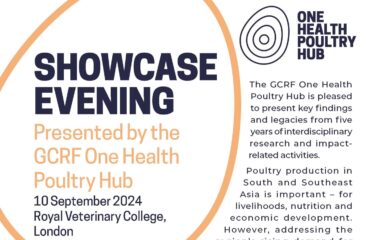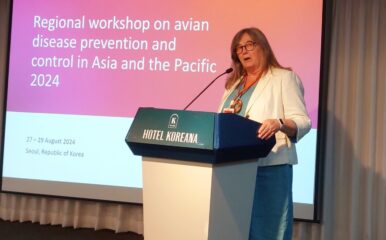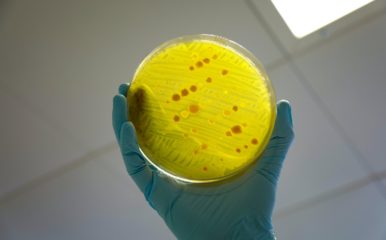
Hub investigators support launch of ‘street art against AMR’ initiative
Published on 23/04/2024
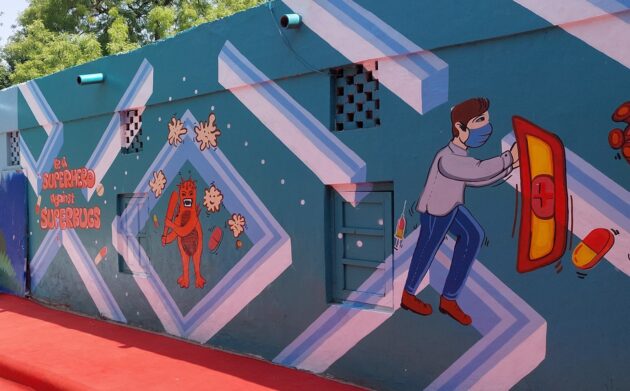
In a first of its kind community engagement and advocacy initiative, a public mural was inaugurated in Khan Market, New Delhi, a collaboration between Superheroes Against Superbugs (SaS) and Delhi Street Art.
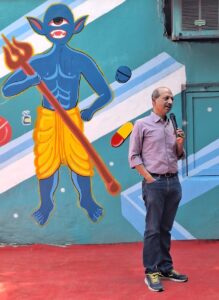
The mural, which spans a large public wall space in a busy upmarket area of central Delhi, was launched on 18 April 2024 by Ambassador Marisa Gerards, of the Netherlands embassy in India. The One Health Poultry Hub was represented at the launch event by Professor Rajib Dasgupta and Dr Shweta Sharma, both of Jawaharlal Nehru University, Delhi.
Antimicrobial resistance (AMR) remains among the top 10 global public health and developmental threats. It has significant economic costs for India, not only in terms of human health but also for the health of animals, plants, agricultural crops, farm productivity and food security. In human health, it pushes countries into increased spending on longer patient care and more intensive care units.
Risk factors for AMR include a lack of access to clean water and quality affordable vaccines, poor awareness and knowledge, and poor infection and disease control measures. Many of these can be addressed if communities are equipped with knowledge.
SaS undertakes projects that inspire young minds to carry the messages of AMR using participatory approaches, adopting a process that focuses on educating and empowering people with updated scientific knowledge.
The mural depicts the message ‘Be A Superhero against Superbugs’ and shows images of superbugs and medications. The design draws upon the imagery of the classic game Pac-Man, depicting a playground in which AMR superheroes combat harmful superbugs. It was inspired by students who participated in a design workshop at the Netherlands embassy, which has supported the whole initiative.
Shweta Sharma said:
Attention has been paid to keep the language on the mural simple for better public understanding as mostly AMR concepts are heavy in technical terms. This public mural serves as an example of giving confidence to the communities to approach public threats in a simpler language that is more balanced yet generates curiosity in them to explore more ways for finding solutions and adopting a safer approach of medicinal drug use.
Rajib Dasgupta said:
Community engagement processes remain a weak link in the evolving national and state action plans being formatted in India. Community engagement enables that knowledge to be equitably co-produced and translated to behaviour change without a top-down prescription or any enforcement of behavior change.
Important participants at the launch event were the school students who entered the painting competition and who expressed their ideas for AMR prevention in the form of art work and drawings. A key highlight was a street play performance by a National Service Scheme (NSS) team of students of the University of Delhi which conveyed the AMR link to antimicrobial misuse by the community and how small but significant steps can safeguard from the threat of AMR.
Elaborating on the ongoing engagements with India, Ambassador Marisa Gerards said: “We believe firmly in collaborating internationally to find new solutions, innovate and discover new paths to fight the crisis and make the world a better place to live in.”
Krishna Mohan Uppu, Secretary New Delhi Municipal Committee (NDMC), committed the continued support of the municipal body to this art project and suggested expanding it to NDMC schools and health institutions.
The project was inspired and co-led by Dr Sarah Hyder Iqbal, a communications and science engagement strategist and former lead in communications and public engagement, DBT/Wellcome Trust India Alliance. She has led innovative public engagement programmes such as the Superheroes Against Superbugs (India), Arting Health for Impact (International) and Planet Divoc-91 (International) among others.

